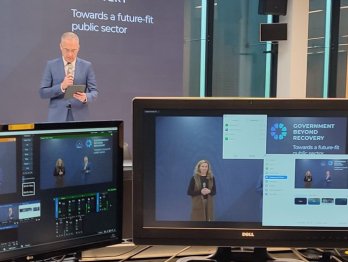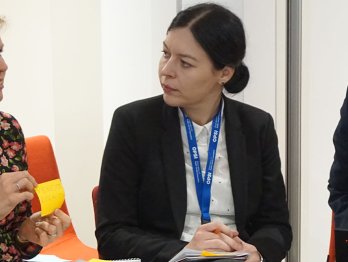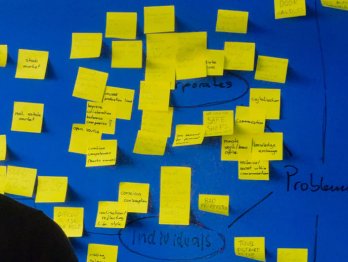COVID-19: Innovative responses update #4

This is our fourth update about innovative responses (including public sector innovation, digital government or open government) being undertaken around the world. Thank you again to all who have contributed in answer to our call and to our partners (including the Centre for Public Impact and GovInsider) for helping us to collect innovative practices. We hope that teams around the world can learn from each other and take inspiration from the information collected. There are now over 200 examples and initiatives in the collection, helping deepen our knowledge and understanding of how the public sector and its partners are responding to one of the most significant crises of recent times.
What can we observe from the additions made since our last update?
- Open calls, hackathons and other challenge-mechanisms: The Greek Ministry of Digital Governance issued a ‘Rapid Implementation of Mature Digi-Tech Strategies’ call to accelerate the implementation of available technological solutions ready for quick implementation, while the National Innovation Agency of Portugal has provided reimbursable support and funding for the immediate development of relevant innovation projects that can help meet medial needs as well and an R&D incentive for relevant pre-commercial projects. Portugal has also issued a call ‘Doctorates 4 COVID-19‘ to fund 50 PhD scholarships on research relating to the pandemic. There has been a hackathon in Portugal, Greece and in Qatar, as well as one pan-European one run by the European Commission, and an online competition in Uzbekistan for online tools and solutions.
- Service delivery in a crisis/adjusting to context: The UAE has identified and made available a whole range of services digitally, while in Korea the Ministry of Food and Drug Safety created a fast-track process for approving testing kits for coronavirus. The Government of Uruguay has emphasised and facilitated the digital delivery of services, and the Government of Qatar has helped citizens to connect with local businesses and spur e-commerce during the crisis by creating an e-Commerce Directory, aided SMEs in their digital transformation, and distributed devices to both students and teachers to facilitate remote learning. In addition, the Qatari Ministry of Interior has used security robots to perform patrols to help prevent gatherings during the time of the crisis. The crisis also accelerated the use in Qatar of its eCourt system and the use of telehealth as well as the creation of ‘virtual clinics’. Portugal’s Colibri collaboration platform helps the research and higher education community to undertake distance learning and remote working, and there is also a dedicated website with a set of resources to support schools in the use of distance learning methodologies.
- Adaptive responses by legislatures: A number of parliaments have introduced new procedures or measures to ensure they can continue to operate despite social distancing and lockdown requirements, including in the UK Houses of Parliament, the European Parliament, the Welsh Assembly and the Danish Parliament
- Structural responses and possible longer-term shifts: Portugal created an Office for Digital Response to Covid-19 to assess and implement digital-based measures, ensuring a coordinated response involving public and private players. The US National Association of City Transportation Officials has created the COVID-19 Transportation Response Center to help cities maintain transport for the movement of essential workers and goods and other crisis-related measures. The City of Milan in Italy is planning to continue the traffic reduction that has happened because of lockdown measures and reallocate street space from cars to cycling and walking, and Norway is allocating resources to support the tourism industry by focusing on and promoting internal tourism
- Improving communications/providing targeted information: Portugal developed a streamlined online help-desk service to assist people with questions about symptoms or their risk factors, and its National Portal of Citizenship for Counties and Parishes created a COVID-19 Dossier automation tool for delivering real-time regional-specific information about the crisis to citizens according to where they live. In Qatar the Ministry of Interior used drones to spread awareness messages to reinforce social distancing, while in Singapore an information portal was established to help residents seeking medical advice easily search clinics that help specifically with respiratory illnesses
- Infection control or tracking measures: The COVID-19 Mobility Data Network is helping to provide daily updates to decision-makers at the state and local levels on how well social distancing interventions are working, using anonymised, aggregated data sets from mobile devices. In Brazil, a group of volunteers developed a site to provide municipal-level information about COVID-19 cases, and in Qatar the National Communicable Disease Surveillance and Vaccination System is being used to track and trace outbreaks and will be complemented by a specific COVID-19 tracking app. Australia has also released a tracking app, COVIDSafe. Korea has introduced a ‘Self Quarantine Safety Protection App’ to both track and support those in quarantine, and one of the regional governments in India introduced ‘Quarantine Watch’ to track and monitor those in individual isolation. Such apps have built on earlier versions, such as the ‘close contact detector’ app that was released in China. Other countries are using AI in interesting ways to help with targeting medical responses, including Maccabi Healthcare Services in Israel using AI to help identify which of the 2.4 million people it supports are most at risk of severe COVID-19 complications, and the Brazilian government using AI to assist in the mapping and tracking of COVID-19 infections. In Singapore there is the deployment of SPOTON, infrared cameras that use AI to detect faces and measure body temperatures
- Leveraging and redeploying existing resources and solutions: Portugal has acted to mobilise the Portuguese scientific community to increase the national test capacity, namely at nursing homes, through the development of a new test protocol. Portugal has also created the ‘Science 4 COVID-19‘ portal to aggregate research and data relevant to combating the epidemic. Meanwhile, the European Commission has created the Digital Response to COVID-19, giving users access to a large resource database including open source software, websites, and platforms that are useful for public administrations, businesses, and citizens dealing with the ongoing crisis. Also, the UNDP’s Astana Civil Service Hub has established a COVID-19 Platform, to help participating countries exchange knowledge and best practices
- Social solidarity and ‘caremongering’: Portugal has established a Volunteer Initiatives Platform that gathers information on all voluntary and solidarity initiatives that aim or support the pandemic situation, helping those who might be seeking to volunteer or contribute. Portugal also has a separate portal to help mobilise volunteering in institutions supporting the elderly
- Other: A school in China had students create hats at home before coming back to school, with 0.5 metre protrusions extending horizontally either side from the hat to help the young children better understand social distancing and staying one metre away from other students while at school.
Caveat
The innovative initiatives here are represented as best as we can, given the information available. Additionally, these examples are included as observations, with no judgement made about their merits. Innovative responses are, by definition, new, and it takes time to know whether new things work, and if they work, whether they are appropriate or wanted.
If you know of other examples, we want to hear from you
We need your help in continuing to add innovative initiatives to the coronavirus crisis and disseminating the call. This not only helps us to gather data to inform our research and support of governments, but it helps others to share ideas and replicable solutions with others around the world. All our work on this topic will feed into the broader work of the OECD in compiling data, information, analysis and recommendations regarding the health, economic, financial and societal challenges posed by the impact of Coronavirus (COVID-19). Please visit the dedicated page for a full suite of coronavirus-related information.









